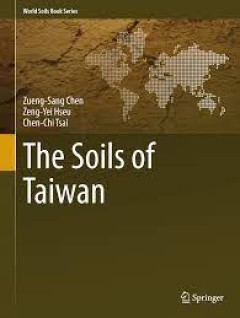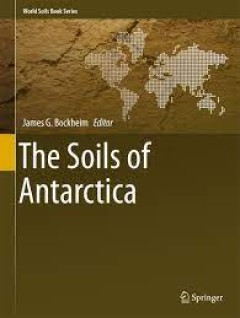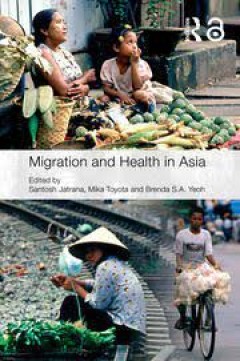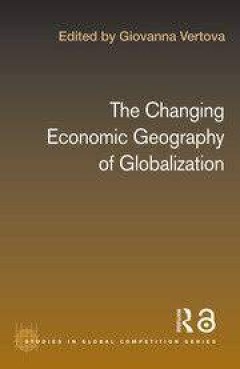Filter by

The Traditional Ecological Knowledge of the Solega A Linguistic Perspective
This book covers the ethnobiology and traditional ecological knowledge (TEK) of the Solega people of southern India. Solega TEK is shown to be a complex, inter-related network of detailed observations of natural phenomena, well-reasoned and often highly accurate theorizing, as well as a belief system, derived from cultural norms, regarding the relationships between humans and other species on t…
- Edition
- -
- ISBN/ISSN
- 978-3-319-24681-9
- Collation
- -
- Series Title
- -
- Call Number
- -

The Soils of Taiwan
This book presents a comprehensive and up-to-date overview on soils of Taiwan. It includes sections on soil research history, climate, geology, geomorphology, major soil types, soil maps, soil properties, soil classification, soil fertility, land use and vegetation, soil management, soils and humans, soils and industry, future soil issues. The book summarizes what is known about the soils in Ta…
- Edition
- -
- ISBN/ISSN
- 978-94-017-9726-9
- Collation
- -
- Series Title
- -
- Call Number
- -

The Soils of Antarctica
This book divides Antarctica into eight ice-free regions and provides information on the soils of each region. Soils have been studied in Antarctica for nearly 100 years. Although only 0.35% (45,000 km2) of Antarctica is ice-free, its weathered, unconsolidated material qualify as “soils”. Soils of Antarctica is richly illustrated with nearly 150 images and provisional maps are provided for …
- Edition
- -
- ISBN/ISSN
- 978-3-319-05497-1
- Collation
- -
- Series Title
- -
- Call Number
- -

Flowering Plants. Monocots: Poaceae
Beyond the treatment of phylogeny and formal taxonomy, the author presents a wide range of information on topics such as the structural characters of grasses, their related functional aspects and particularly corresponding findings from the field of developmental genetics with inclusion of genes and gene products instrumental in the shaping of morphological traits (in which this volume appears …
- Edition
- -
- ISBN/ISSN
- 978-3-319-15332-2
- Collation
- XV, 416 hlm.
- Series Title
- The Families and Genera of Vascular Plants
- Call Number
- -

Flowering Plants. Eudicots: Aquifoliales, Boraginales, Bruniales, Dipsacales,…
This volume covers the orders Boraginales, Garryales and Solanales (except Convolvulaceae) of the Lamiids (Asterids I) as well as three unplaced families of that clade, i.e. Vahliaceae, Icacinaceae and Metteniusaceae, and the orders Aquifoliales, Escalloniales, Bruniales, Dipsacales and Paracryphiales of the Campanulids (Asterids II). It is the first of two final volumes to (almost) complete th…
- Edition
- -
- ISBN/ISSN
- 978-3-319-28534-4
- Collation
- XII, 412 hlm.
- Series Title
- The Families and Genera of Vascular Plants
- Call Number
- -

Flowering Plants. Eudicots: Santalales, Balanophorales
Santalales are predominantly hemiparasites connected with either the branches or the roots of other green land plants, whereas Balanophoraceae are holoparasites that form terrestrial tubers attached to the roots of woody hosts. In both orders, parasitism has led to considerable reductions of the vegetative and reproductive organs and detailed descriptions are given on the initiation of ramal an…
- Edition
- -
- ISBN/ISSN
- 978-3-319-09296-6
- Collation
- X, 213 hlm.
- Series Title
- The Families and Genera of Vascular Plants
- Call Number
- -

Rural-Urban Interaction in the Developing World
Sustaining the rural and urban populations of the developing world has been identified as a key global challenge for the twenty-first century. Rural-Urban Interaction in the Developing World is an introduction to the relationships between rural and urban places in the developing world and shows that not all their aspects are as obvious as migration from country to city. There is now a growing r…
- Edition
- -
- ISBN/ISSN
- 9780203646274
- Collation
- -
- Series Title
- -
- Call Number
- -

Seductions of Place Geographical Perspectives on Globalization and Touristed…
The seductiveness of touristed landscapes is simultaneously local and global, as travelled places are formed and reworked by the activities of diverse, mobile people, in their desires to experience situated, sensuous qualities of difference. Cartier and Lew’s interesting and informative book explores contemporary issues in travel and tourism and human geography, and the complex cultural, poli…
- Edition
- -
- ISBN/ISSN
- 9780203645796
- Collation
- -
- Series Title
- -
- Call Number
- -

Migration and Health in Asia
The processes of migration and health are inextricably linked in complex ways, with migration impacting on the mental and physical health of individuals and communities. Health itself can be a motivation for moving or a reason for staying, and migration can have implications on the health of those who move, those who are left behind, and the communities that receive migrants. This volume bri…
- Edition
- -
- ISBN/ISSN
- 9780203013564
- Collation
- -
- Series Title
- -
- Call Number
- -

The Changing Economic Geography of Globalization
The process of globalization has had profound, often destabilizing, effects on space, at all levels (i.e. local, regional, national, international). This revealing book analyzes, both theoretically and empirically, the effects of globalization over space. It considers, through a dialogue among different paradigms, the ways in which space has become more important in the global economy. Globa…
- Edition
- -
- ISBN/ISSN
- 9780203000403
- Collation
- -
- Series Title
- -
- Call Number
- -
 Computer Science, Information & General Works
Computer Science, Information & General Works  Philosophy & Psychology
Philosophy & Psychology  Religion
Religion  Social Sciences
Social Sciences  Language
Language  Pure Science
Pure Science  Applied Sciences
Applied Sciences  Art & Recreation
Art & Recreation  Literature
Literature  History & Geography
History & Geography